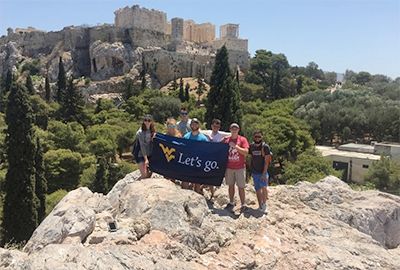Program Information
Objectives and Overview
The Greece IRES program is an NSF-funded partnership between WVU and the University of Crete - FORTH. The goal is to expose students to research and a foreign culture. By providing them with hands-on experience, students will learn what makes an effective researcher and how to conduct their own research work. By the end of the program, student teams will have written a paper on their topics (with the intent to publish) and have created a presentation on their work. If students maintain interest in their work upon returning, efforts will be made to help situate them in an appropriate laboratory environment.
The program consists of three segments. In the first portion, students will gain an introduction to research and their topics of study. In the second, students will travel to Greece to begin their projects. Upon returning, they will finalize their research, conducting any further experiments and summarizing their findings in an article. Students will conduct projects in the area of materials science, specializing in topics pertaining to gas sensing, photoctalytic and thermochromic materials.
Expenses
Housing and travel expenses for the program are covered; this includes the hotel; round trip tickets for airfare and sailing to the island; as well as for travel between the living quarters, FORTH and locations on the island. Students are paid $3,000 for their efforts (half before the program, half upon project completion). Additionally, students receive an $800 living stipend during their stay on Crete.
Living
Students will spend the duration of their trip at Arolithos, a hotel modeled after traditional Cretan villages. Arolithos is situated 10 minutes from the University of Crete - FORTH and 15 minutes south of Heraklion. You can find more details about the hotel from the
Arolithos website.
Research
Students are active in all portions of their research projects. They begin by conducting literature review in the areas of gas sensing, photocatalysis and thermochromics. While in Greece, they will do the experimental end of their work, typically being on campus between 9 a.m.-5 p.m. They will work to set up the process for designing their material or samples. This may include development of pastes, use of spray pyrolysis and sputtering equipment. Samples are characterized with respect to their structure, transmittance/reflectance, sensitivity to gas/light/applied heat, hydrophobicity and more. Participating undergraduates conclude by assembling their work into a written article and presentation.
Travel
At Home (WVU)
Fall 2016 - Information sessions
October - Application submission/student selection
Spring 2017 - Students take ENGR 393
In the Nanotechnology & Sustainability course, students are introduced to research methods. They learn how to conduct literature review and how to operate some equipment related to materials science. As the semester progresses they will be exposed to current nanotechnology research and its impacts on sustainability and the human environment.
Summer 2017 - Selection
Eight students are selected to participate in the program. They are then split into groups and begin literature review on their research topics.
Abroad (FORTH)
Late June 2017 - Students depart for Greece
Students arrive in Athens and spend two days in the city. While there Dr. Korakakis will aid in their transition to the new culture. Students visit historic/cultural sights as they traverse the city. The group will then travel to Crete via boat.
July 2017 - Research and Exploration
Once arrived in Greece, the students will be shown the city their living arrangements, the University of Crete and the primary cities on the island - Heraklion and Chania. Students will begin to conduct their research throughout the week, interacting closely with their Greek counterparts. At the end of the research trip, students will present their findings to the groups from Greece and WVU. Evenings and weekends will be at the groups' discretion to explore the culture, history and geography of the island.
August 2017 - Return
Students will have a few days to investigate the culture of another Greek island or the mainland. After, they will return to the U.S.
Return (WVU)
Fall 2017 - Conclusion
Students will conduct any remaining experiments to complete their research. Upon completion, they will do a formal write-up, potentially resulting in a journal publication. Should students continue to take interest in their work, they will have the opportunity to be placed in a research lab at WVU, so that they may continue.
